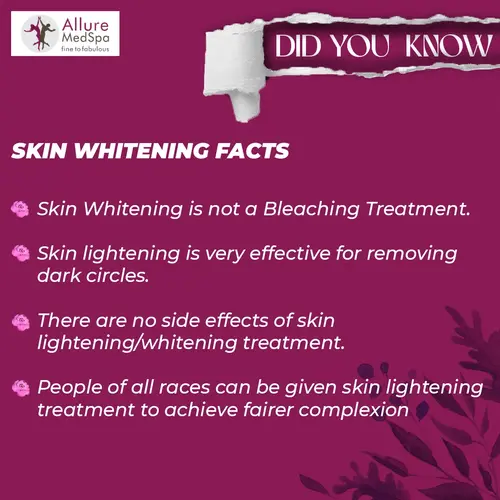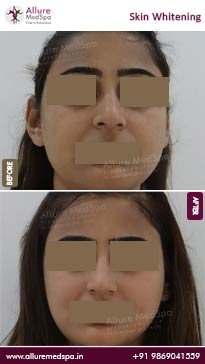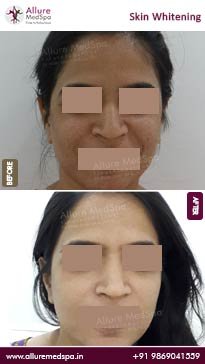Celebrity Cosmetic Surgeon Dr. Milan Doshi

Indian Board Certified Plastic Surgeon
M.CH, MS, ISAPS Mentor
11000+ Cosmetic Surgeries
1000+ Skin Whitening
Skin Whitening Treatment: Reveal Radiant, Even-Toned Skin Safely
Wishing for Brighter, Even-Toned Skin?
- Do you feel disheartened by uneven skin tone or dull complexion that hides your natural beauty?
- Are you hesitant to wear your favorite colors or go makeup-free because of pigmentation or a darker skin tone?
- Does your skin make you feel less confident in social settings or professional spaces?
When your skin tone doesn’t reflect your inner glow, it can affect more than just appearance—it can dampen your confidence, mood, and the way you carry yourself.
Many individuals with wheatish or deeper complexions feel limited by societal beauty standards, even though true beauty lies in self-love and self-care.
Skin Whitening Treatment offers a safe and effective way to enhance your natural skin tone, improve overall radiance, and boost your skin’s clarity. Powered by Glutathione—a clinically proven antioxidant—it reduces melanin production, detoxifies the skin, and promotes a glowing, even complexion from within.
Global & Indian Trends (ISAPS 2023):
According to the ISAPS Global Survey 2023:
- Over 2.7 million non-surgical skin rejuvenation procedures were performed globally in 2023.
- India ranks among the top 5 countries for skin lightening and brightening treatments.
- Demand for Glutathione-based therapies has grown steadily due to proven safety and efficacy.
Let’s explore how Skin Whitening Treatment works, what makes it effective, and how you can safely achieve radiant, glowing skin that reflects the best version of you.
What Is Skin Whitening Treatment?
Skin Whitening Treatment is a dermatological procedure that brightens and evens out the skin tone by using Glutathione, a powerful antioxidant that inhibits melanin production. It helps in achieving a fairer, clearer, and smoother complexion while also boosting skin health and immunity.
Synonyms for Skin Whitening Treatment:
Skin Lightening Therapy, Glutathione Skin Brightening, Complexion Enhancement Treatment, Melanin Reduction Therapy, Skin Tone Correction Procedure
“skin whitening treatment cost in mumbai”
Skin Whitening Treatment Before & After Images
“Your Skin Whitening Treatment Cost”
Skin Whitening Treatment Testimonials: Celebrities Patient

Awarded by Google.com
Rating: 4.8
Reviews: 369+

Awarded by WhatClinic.com
Rating: 4.8
Reviews: 100+

Awarded by Realself
Rating: 4.9
Reviews: 440+

Awarded by Facebook
Rating: 4.6
Reviews: 105+
What Are the Main Causes of Darker Skin Tone?
Dark skin tone is primarily influenced by melanin levels, sun exposure, and genetic factors based on ethnicity and geographic location.
- Melanin Production: Higher melanin levels result in darker skin, hair, and eyes. This is a natural protective pigment in the skin.
- Ethnic & Genetic Factors: People from tropical or equatorial regions often inherit more melanin, leading to naturally darker complexions.
- Geographic Location: Regions with intense UV radiation tend to have populations with deeper skin tones due to evolutionary adaptation.
- Sun Exposure: Prolonged sun exposure triggers increased melanin production, which can cause the skin to appear tanned or darker.
What Are the Key Facts About Skin Whitening Treatment?
Skin whitening is a safe cosmetic procedure aimed at brightening complexion and reducing pigmentation without harsh bleaching effects.
- Not a Bleaching Treatment: Skin whitening works by inhibiting melanin, not bleaching the skin’s natural tone.
- Effective for Dark Circles: Skin lightening treatments are commonly used to reduce under-eye pigmentation.
- Minimal to No Side Effects: When done under expert supervision, modern whitening treatments are safe and skin-friendly.
- Suitable for All Skin Types: Individuals of any race or skin tone can undergo treatment to achieve a more even, radiant complexion.

What Are the Advantages of Skin Whitening Treatment?
Skin whitening treatment helps brighten your complexion, reduce pigmentation, and rejuvenate skin for a youthful, even-toned appearance.
- Enhances skin fairness by reducing excess melanin production.
- Improves skin texture and evens out skin tone.
- Delays signs of ageing by restoring a youthful glow.
- Rejuvenates dull skin with smoother, radiant results.
- Boosts self-confidence through visible skin clarity.
What Are the Different Types of Skin According to Fitzpatrick Classification?
The Fitzpatrick scale classifies skin types based on sun sensitivity, melanin levels, and pigmentation to guide treatment and sun protection methods.
- Type 1: Very fair, always burns, never tans – e.g., redheads with freckles.
- Type 2: Fair, burns easily, tans minimally – e.g., fair-skinned Caucasians.
- Type 3: Medium skin, sometimes burns, tans gradually – e.g., darker Caucasians.
- Type 4: Olive skin, rarely burns, tans easily – e.g., Mediterranean and some Hispanics.
- Type 5: Brown skin, very rarely burns, tans well – e.g., some Blacks and Indians.
- Type 6: Deeply pigmented, never burns – e.g., darker-skinned individuals of African descent.
Am I the Right Candidate for Skin Whitening Treatment?
You’re a good candidate for skin whitening if you experience pigmentation, dark patches, or skin darkening due to sun damage, scars, or aging.
- People with uneven skin tone, pigmentation, or dark patches
- Those experiencing age spots, sun spots, or stretch marks
- Individuals with acne scars or other facial scarring
- People with naturally tan or dark skin seeking a lighter tone
- Anyone whose skin has darkened due to prolonged sun exposure
What Is the Structure of Human Skin?
Skin consists of three layers—epidermis (outer), dermis (middle), and subcutaneous (inner)—where most treatments act on the top two layers.
- Epidermis: Visible outermost layer where pigmentation is treated
- Dermis: Middle layer holding collagen and melanin cells
- Subcutaneous Layer: Deep layer with fat cells, rarely targeted in whitening
What Are the Different Treatments for Skin Whitening?
Skin whitening treatments work by reducing melanin production using lasers, creams, peels, or oral methods—tailored to your skin type and goals.
- Skin Lightening Creams: Contain agents like hydroquinone, kojic acid, or arbutin to gradually lighten pigmentation.
- Chemical Peels: Glycolic acid or Cosmelan peels exfoliate dead skin and reduce melanin for a brighter tone.
- Laser Skin Whitening: Laser beams target melanin deposits and stimulate collagen to even skin tone.
- Microdermabrasion: Removes the upper skin layer to reduce spots, blemishes, and discoloration.
- Glutathione Injections or Oral Supplements: Boost antioxidants and detoxify the skin, helping achieve a lighter glow over time.
- Medical Facials: Hydrafacial, oxyfacial, or PRP facials enhance overall skin texture and brightness.
How Does Skin Lightening Work?
It works by targeting melanin—either by slowing its production, removing existing pigment, or boosting cellular turnover.
- Topical treatments lighten skin from the outside
- Lasers and peels act deeper by affecting the dermis
- Oral or injectable treatments work systemically
How Many Sessions Are Required for Visible Whitening Results?
Most patients start noticing visible skin lightening results after 4 to 6 sessions, depending on their skin tone, pigmentation level, and chosen treatment.
- Glutathione IV therapy: Usually 6–8 sessions weekly for visible glow
- Chemical peels: 4–6 sessions at 2–3 week intervals
- Laser toning: Results seen in 5–7 sessions spaced 10–14 days apart
- Combination treatments: Fewer sessions may be required when combined with oral antioxidants, sun protection, and a brightening skincare routine
- Maintenance: Monthly or quarterly touch-ups may be recommended for long-term results
For best results, Dr. Milan Doshi will personalize the number of sessions based on your skin analysis and medical history.
What Are the Risks Involved in Skin Lightening Treatments?
Skin lightening is safe when done by a certified dermatologist using FDA-approved products, but unsafe practices can lead to serious side effects.
- Mercury Poisoning: Unregulated creams may contain mercury, leading to kidney or neurological damage.
- Skin Thinning: Overuse of steroid-based products can make skin fragile and sensitive.
- Post-Inflammatory Hyperpigmentation: Poor technique can worsen dark spots instead of reducing them.
- Allergic Reactions: Harsh chemicals can cause redness, itching, or rashes.
- Cancer Risk: Non-FDA-approved or carcinogenic agents increase the long-term risk of skin damage.
- Infections or Burns: Improper laser or peel usage may result in scarring, burns, or infections.
Important: Always choose a board-certified cosmetic dermatologist who uses US-FDA approved technology and protocols to minimize risks and ensure safe outcomes.
What Home Remedies Can Help With Skin Whitening Naturally?
Simple home remedies like lemon, honey, and cucumber can help brighten your skin naturally by reducing pigmentation and improving tone.
- Lemon Juice & Honey: Mix equal parts of fresh lemon juice and honey. Apply on your face for 15 minutes, then rinse. It helps lighten pigmentation.
- Honey & Cinnamon: Combine a teaspoon of honey with a pinch of cinnamon. Apply this paste to your face to promote an even skin tone.
- Cucumber & Lemon Juice: Blend cucumber juice with a few drops of lemon juice. Dab gently on your face for a cooling, lightening effect.
These natural remedies work gradually. For deeper pigmentation or faster results, consider consulting a dermatologist for advanced treatments.
What Is the Cost of Skin Whitening Treatment in Mumbai, India?
Skin whitening treatment in Mumbai typically costs between ₹6,000 to ₹9,000 per session, based on the dose and combination of glutathione, NAC, and Vitamin C.
- Glutathione Dosage: Varies from 3000mg to 4200mg per session
- Optional Add-ons: N-Acetyl Cysteine (NAC) & Vitamin C boosters may increase cost
- Package Offers: Discounts available on combo sessions or happy hour deals
The total cost also depends on:
- Dermatologist’s expertise and consultation fee
- Quality of FDA-approved medicines used
- Technology and techniques involved (IV drip, injections, laser, etc.)
- Facility standards and hygiene practices
- Post-treatment follow-ups and care plans
To get a personalized estimate, it’s best to book a consultation with an expert dermatologist at a reputed cosmetic center like Allure Medspa.
Which Is the Best Cosmetic Centre for Skin Whitening Treatment in Mumbai, India?
Allure Medspa in Mumbai is widely recognized for offering safe, effective, and advanced skin whitening treatments tailored to individual needs.
- World-class infrastructure: NABH & ISO-certified facility with US-FDA approved technologies
- Expert team: Led by celebrity cosmetic surgeon Dr. Milan Doshi and experienced dermatologists
- High safety standards: Strict sterilization, fumigation, and hygiene protocols
- Comprehensive aftercare: Dedicated staff to assist with recovery, medication, and follow-ups
- Faster healing: Monitored recovery process with personalized care plans
- Patient-first environment: Comfortable hospital stay with warm, homely ambiance
With thousands of successful cases and global patient trust, Allure Medspa is one of Mumbai’s top choices for skin lightening and rejuvenation treatments.
Who Is the Best Doctor for Skin Whitening Treatment in Mumbai, India?
Dr. Milan Doshi at Allure Medspa is a leading cosmetic surgeon in Mumbai known for delivering natural-looking, safe results in skin whitening treatments.
If you’re looking for a trusted expert in skin lightening or whitening treatments in Mumbai, Dr. Milan Doshi at Allure Medspa is your go-to name. With decades of experience and a reputation built on 15,000+ successful cosmetic procedures, Dr. Doshi offers a patient-first approach with scientifically backed treatments like glutathione IVs, advanced chemical peels, laser skin toning, and more. Every procedure is tailored based on skin type, concern, and medical history to ensure optimal, safe results.
- 25+ years of experience in aesthetic and cosmetic procedures
- Over 15,000 satisfied patients including international clientele
- Expertise in glutathione infusions, laser toning, peels & injectables
- Founder of Allure Medspa – a NABH & ISO-certified cosmetic surgery center in Mumbai
- Thorough consultation to determine the right whitening approach for your skin
- Personalized guidelines before and after treatment for long-lasting results
(FAQ's) Frequently Asked Question of Skin Whitening Treatment?
Q1. What is the most effective laser for skin whitening?
Q-switched Nd:YAG laser and fractional CO2 laser are considered highly effective for reducing pigmentation and achieving skin lightening with minimal downtime.
Q2. Can I combine skin whitening treatment with chemical peels?
Yes, many dermatologists combine chemical peels with other whitening treatments like lasers or glutathione for enhanced results, depending on your skin sensitivity and goals.
Q3. Does skin whitening treatment help with acne scars?
Yes, certain whitening treatments such as lasers and chemical peels also help reduce post-inflammatory hyperpigmentation and fade acne scars.
Q4. Can men undergo skin whitening treatment?
Absolutely. Skin whitening treatments are equally effective for men and women, and customized plans are available based on skin type and lifestyle.
Q5. Are there skin whitening treatments for sensitive skin?
Yes, treatments like mild peels, glutathione, and dermatologist-supervised topical agents can be safely used for sensitive skin types.
Q6. Is there a difference between fairness and skin whitening?
Fairness generally refers to a lighter skin tone, while skin whitening aims at reducing excess pigmentation for an even-toned, radiant complexion—not altering your natural skin tone.
Q7. Does skin whitening treatment remove tan?
Yes, procedures like laser toning, peels, and glutathione injections can help remove sun tan and restore your natural skin tone.
Q8. Can I do skin whitening treatment at home?
While home remedies and OTC products exist, professional skin whitening treatments at clinics offer faster, safer, and more visible results with dermatologist guidance.
Q9. Will whitening treatments make my skin more sensitive to sunlight?
Yes, your skin may become temporarily more sensitive to UV rays, so daily sunscreen use and sun protection are essential after treatment.
Q10. Are there any age restrictions for skin whitening treatments?
Most dermatologists recommend these treatments for individuals above 18 years. However, milder options may be used in teens under professional supervision.
Q11. Do skin whitening injections work for all skin types?
Glutathione-based skin whitening injections work best for individuals with darker or uneven skin tones, though results may vary based on skin type and underlying pigmentation.
Q12. Can I wear makeup after a whitening treatment session?
It is advisable to avoid makeup for at least 24–48 hours post-treatment to allow the skin to heal and avoid any reaction or blockage of pores.
Q13. How do I maintain skin whitening results after treatment?
Consistent skincare routine, sun protection, hydration, and maintenance sessions (as advised by your doctor) help in preserving results long-term.
Q14. Is skin whitening safe during pregnancy?
Most in-office treatments are avoided during pregnancy. However, mild topical agents or natural remedies may be recommended under dermatologist supervision.
Q15. Does skin whitening affect skin health?
When done under expert care, skin whitening treatments improve skin health by reducing pigmentation and boosting collagen through controlled procedures.
Q16. Can skin whitening treatments help with underarm darkness?
Yes, targeted whitening treatments such as peels, lasers, and depigmenting creams are often used to treat underarm and intimate area darkness.
Q17. How long does a single skin whitening session last?
Most in-clinic treatments like chemical peels or laser toning last between 30–60 minutes, depending on the treatment type and area covered.
Q18. Can I get skin whitening treatment if I have acne?
Yes, in fact many whitening treatments also address acne marks and hyperpigmentation, but active acne must be treated first for best outcomes.
Q19. Do whitening treatments help with uneven skin texture?
Absolutely. Treatments like fractional lasers and microneedling improve both pigmentation and skin texture by promoting collagen and exfoliation.
Q20. Are there permanent alternatives to skin whitening creams?
Yes, procedures like laser skin whitening and glutathione therapy provide longer-lasting results compared to over-the-counter creams, which offer only temporary effects.
Medical Code for Skin Whitening Treatment
ICD-10 Codes for Skin Whitening Treatment
| ICD-10 Code | Description |
|---|---|
| L81.0 | Melasma (common pigmentation disorder treated with skin whitening) |
| L81.4 | Other melanin hyperpigmentation (dark spots, uneven tone) |
| L57.0 | Actinic keratosis (sun-induced pigmentation) |
| R23.4 | Changes in skin texture (dullness, patchiness) |
| Z41.1 | Encounter for cosmetic surgery or skin whitening procedure |
CPT Codes for Skin Whitening Treatment
| CPT Code | Description |
|---|---|
| 15788 | Chemical peel, facial; epidermal (for whitening and brightening) |
| 15789 | Chemical peel, facial; dermal (medium-depth peel for deeper pigmentation) |
| 96365 | Intravenous infusion, initial (e.g., Glutathione IV drip) |
| 96440 | Injection or infusion of non-chemotherapy drug (e.g., Glutathione IM/IV) |
| 17999 | Unlisted procedure, skin (e.g., oral or topical whitening protocols) |
| 96920 | Laser treatment of skin (used for whitening and pigmentation) |
Related Links
Note: The author of this content is Dr. Milan Doshi, An Indian board-certified plastic & cosmetic Surgeon wholly & solely confirms the authenticity of the information & knowledge delivered by this write-up.








